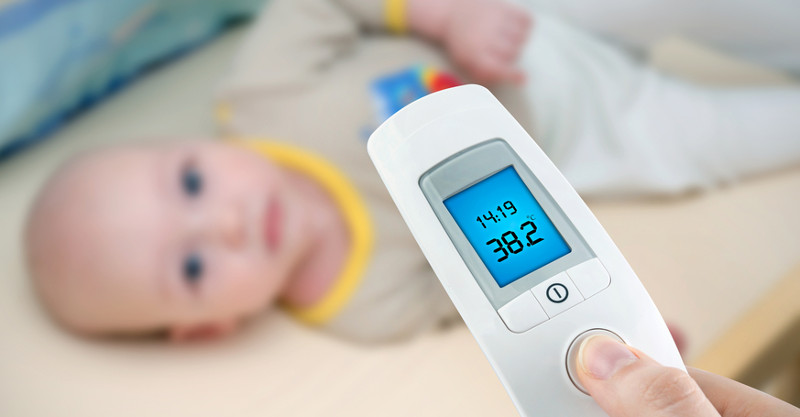5 things you should know about babies and fevers

Fever in babies can be frightening, and it’s likely your little one will experience instances of temperature spikes during childhood. It’s incredibly difficult to watch your child go through any illness, but remember that fevers actually play a part in helping kids when they’re unwell. Here’s what you need to know – from how to tell your child has a fever, when to act and what to do.
What is a fever?
- Here’s the main point to remember about a fever – it’s the body’s way of fighting something. So while your child may have a fever that makes them uncomfortable, it’s their little immune system’s way of fending off a cold or minor infection. However, with all children (but especially babies and infants) it’s really important to keep a close eye on your child’s temperature.
- A temperature over 38°C in a child indicates a fever.
- Watch for other signs like lethargy, poor eating and sleeping which could indicate a more serious infection, and could escalate into a convulsion or seizure. Make sure you invest in a good quality digital thermometer to accurately assess your baby’s temperature – sometimes babies can feel hot to touch, but their core temperature is normal.
- A fever can come on quite suddenly, but it’s important to remember that the severity of the fever doesn’t necessary mean the illness is severe.
What should you do?
If your baby is older than three months, there are some things you can do at home to try and bring their temperature down:
- You can try putting them in cooler clothing (but don’t undress them completely), or put more clothing on them depending on whether they’re feeling hot or cold.
- Keep them hydrated by continuing breastfeeding, bottle feeding or offering water.
- Medication can often help bring down a fever and make your baby more comfortable. Baby paracetamol is safe to give babies more than a month old, but always check with your health professional first. Babies under six months should not be given ibuprofen, and babies should not be given aspirin either.
When should you call a doctor?
Your child needs to see a doctor if:
- Your baby is under three months old and has a fever, rash, problems breathing or eating or appears to be dehydrated (a sunken fontanelle, a dry mouth, sunken eyes, fewer wet nappies and no tears when crying).
- Your baby is six months or younger and has a temperature above 38°C.
- The fever lasts longer than 24 hours.
- There is no change in the fever even after giving your child paracetamol.
- Your child won’t drink.
- Your child has an earache.
- They’re pale or weak.
- Your child is drowsy.
- Remember, you are the expert on your child and should always trust your instinct. If you feel your child needs medical attention, and your regular GP is closed, don’t hesitate to call a home doctor to treat your baby at home.
When a fever becomes an emergency
If your child has any of these symptoms, you need to act quickly to get your child to hospital:
- Severe vomiting that prevents your child keeping anything down.
- They have difficulty swallowing or breathing.
- Their breathing is abnormally fast.
- The soft spot (fontanelle) on a baby’s head is bulging.
- They are fitting or convulsing.
- Their neck is stiff or rigid.
- They have a rash.
- They are aged under three months and have a fever.
What should I do if my child has a convulsion or seizure?
- Children can have a febrile convulsion or seizure when they have a high temperature, and this is quite common between the ages of six months and six-years-old.
- While seizures are frightening, most will stop after about five minutes.
- Try and stay calm, lay your child on their side and make sure they don’t have anything in their mouth.
- If the seizure lasts longer than five minutes, or your child’s breathing isn’t normal or they vomit after the convulsion, call an ambulance.
Always remember to seek medical advice if you’re unsure about your child’s health.

